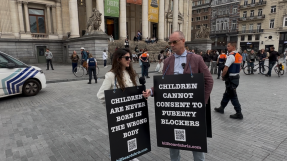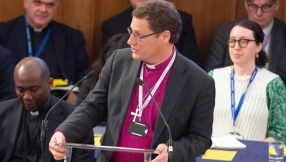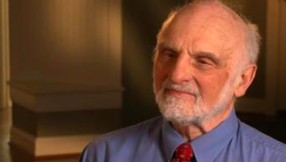
Hebrew scholar and Jewish academic Irene Lancaster explains the Jewish perspective of the Sabbath.
‘On six days work may be done, but on the seventh day there shall be a Shabbat Shabbaton of complete rest, a sacred occasion.’
So run the famous words of Leviticus 23:3, in our Torah reading for May 17, Emor (Leviticus 21-24). What does Shabbat, the day of rest, mean to the Jewish people?
In 1951, Rabbi Abraham Heschel wrote his famous book ‘The Sabbath: Its Meaning for Modern Man.’ To the interested reader, he explained that Shabbat is like a Temple in time. Jews honour time rather than space - a perspective that is different from many other groups and may be a difficult concept for many to grasp.
Recently, however, the famous medical doctor and best-selling podcaster, Rangan Chattergee, in his latest book, ‘Make Change that Lasts’, devotes almost an entire chapter to his experience of Shabbat as the guest of fellow pupils from local Manchester Grammar School.
Here the young Rangan encountered for the first time the Shabbat home lives of his Jewish contemporaries, where he gained a real sense of food, family, community, argument and rest from the weekday world. Quiet, however, it wasn’t.
He concludes that modern man is simply too busy and that we should learn to slow down and give it a rest. Judaism, he thinks, is the answer to the busyness of life and he encourages us to learn from this example.
Another descriptive master of the atmosphere surrounding Shabbat is Chief Rabbi Shear Yashuv Cohen of Haifa, son of the Nazir of Jerusalem, friend of Rav Kook, discussed in previous articles.
As a young man, studying at Merkaz HaRav Yeshiva School, founded by Israeli Chief Rabbi, Rav Kook, he depicts encounters on late Friday afternoon, towards dusk, with Rabbi Charlap, his teacher and mentor. This is how he describes the onset of Shabbat in the home of this great rabbi, as outlined in my English-language version of 'Rabbi Shear Yashuv Cohen: Between War and Peace':
‘Rabbi Charlap lived in a modest home on the west side of Jerusalem and was therefore affectionately known as "the Light of the West." Every Friday he would stop writing at noon, in order to immerse in the mikveh, don white garments, and get ready for Shabbat ... It was during those very special times, just before the onset of Shabbat, that his face would really shine as a light from heaven. At those times Rabbi Charlap was completely relaxed, and it was then that we could chat with him straight from the heart, opening up our innermost souls to him. We loved to visit at these times, simply to imbibe the amazing ambience in which he appeared to us as one of G-d’s very angels. At these times, too, he would answer our questions and assuage the various doubts that had assailed us throughout the week.’
These examples set the scene for Rabbi Cardozo’s contemporary take on the uniqueness of Shabbat, in which, in his new book on Leviticus, he also uses light as an analogy:
‘There is perhaps no natural phenomenon which has fascinated human beings so much as light. Light moves with a speed of 186,000 miles a second ... Another phenomenal aspect of light is that its speed cannot be influenced ... But … the greatest miracle which light shows us … is that it "strolls." It symbolizes rest.'
It continues, "For Jews, this kind of ‘strolling light’ is introduced Friday afternoon, when the sun starts to set, announcing the Shabbat. This light radiates through the windows, and after sunset, its spiritual equivalent, an inner light symbolized by the Shabbat candles, takes over ... This light compels us to stop working, because we experience something so amazing that it refutes ‘work’ in the conventional sense of the word ... It is this light which teaches us to abstain from driving a car, using our computer and our cellphones; to cease speaking about our finances ... Instead of believing that abstaining from these devices is ‘old fashioned’, we realize that it is ‘future fashioned ... ’
As he observes, it is actually by abstaining that we become able to create and transform ourselves. In fact, he describes it as 'the highest form of creativity'. But, as he explains, we cannot see the strolling light unless we let it in.
He goes on to explain that 'abstinence on Shabbat is not a state of passivity' and that it 'requires great courage to say "No".' The 'tragedy' of modern life is that so many of us cannot say no because we are 'wedded to our addiction' and instead of us ruling over the objects in our life, are instead ruled over by them. We could say 'no', but 'laziness and fear' keep us from doing so.
Thus the 'real victim of modernity' is not those who observe Shabbat but the ‘progressive’ person who does not, as he writes:
'It is not progressiveness but spiritual narrow-mindedness that has overtaken him. He is at war with the world, not able to escape it, and consequently has no inner rest. He must keep himself busy ... And thus, many come to believe that they are only human when they stay constantly busy.
'They argue vehemently against the laws of Shabbat, because observing these laws would reveal their lack of inner peace ... Those who observe Shabbat, on the other hand, do not go shopping, answer phone calls or emails, watch television or drive. For one entire day, we do not need these addictions.
'Just like the mysterious light of Shabbat, we stroll. Unlike the sprinter who runs to reach the finish line without taking notice of his surroundings, we see the beauty of nature around us. We observe the inner beauty of our spouses and the sweetness of our children ...
'Shabbat sets priorities in perspective. It objects to our way of living, protests against our indifference to the meaning of life, and rebels against our superficiality. We can only stroll with ourselves when we have no attachments.’
Thus Shabbat is shown by Rabbi Cardozo to be not only the bedrock of the Jewish religion, around which the entire week is planned, but also the premier antidote to the unthinking busyness of many of our lives. As Rabbi Cardozo says, the strolling light of Shabbat is the art of creative abstinence.













